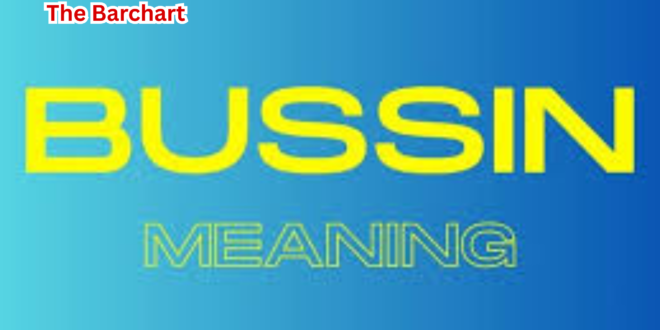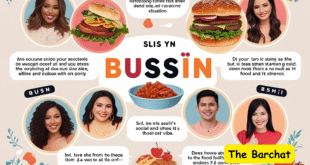The term “bussin” has become one of the most widely used slang expressions in today’s digital culture, especially on platforms like TikTok, Instagram, and Twitter.
Originally rooted in African American Vernacular English (AAVE), the bussin meaning refers to something that is exceptionally good, delicious, or impressive—most commonly used to describe food.
Over time, the usage has expanded to include fashion, music, vibes, and even experiences.
When someone says, “This is bussin,” they’re expressing enthusiastic approval or praise.
This ultimate guide explores the bussin meaning in-depth—from its origins in street culture to its evolution through pop culture and viral trends.
Whether you’re new to the term or just want to understand how to use it correctly, this article breaks down the nuances, comparisons, and contexts where “bussin” fits best.
It’s everything you need to know about one of the internet’s most flavorful and expressive slang words.
What Is the Bussin Meaning in Modern Slang?
The bussin meaning in modern slang is often used to describe something that is exceptionally good, particularly food.
When someone says, “This pizza is bussin,” they mean it tastes amazing or delicious.
The term has become especially popular among Gen Z and is widely used across social media platforms to express strong approval or excitement.
Unlike traditional adjectives like “tasty” or “delicious,” the word “bussin” adds a layer of cultural flavor.
It’s more than just a compliment—it’s a vibe, an expression that something is next-level.
Though it started with food, people now use it to describe anything impressive, from outfits to performances.
As with many slang terms, bussin meaning varies slightly depending on the context.
In some circles, it’s used more casually, while in others, it carries a humorous or exaggerated tone.
Still, the core idea remains: it’s something so good, it deserves hype.
Whether you’re hearing it in a viral TikTok or a friend’s text, you now know what it means—bussin is a high compliment in today’s lingo.
Exploring the Bussin Meaning on Social Media Platforms
Social media has played a huge role in popularizing the bussin meaning across different age groups and regions.
Platforms like TikTok, Instagram, Twitter (X), and Snapchat have been key in spreading this slang word, turning it from niche street lingo into a global buzzword.
On TikTok, users often post food reviews or reactions with captions like “This is straight bussin fr fr,” signaling that whatever they’re eating or experiencing is top-tier.
The bussin meaning here goes beyond just good—it’s about something that exceeds expectations.
The slang is often paired with emojis to add extra flair.
Instagram Reels and Stories feature influencers using “bussin” while reviewing makeup, clothes, or meals.
Even YouTube vloggers and streamers have adopted the term in titles and content.
The trend has also sparked memes, remix videos, and even comedic skits, giving the word a broader pop-cultural weight.
Thanks to social media, the bussin meaning is now widely recognized, even among people who don’t typically use slang.
It’s proof of how language evolves in real-time through digital culture and online trends.
Bussin Meaning in Pop Culture and Music
Pop culture and music have significantly influenced the spread of the bussin meaning, especially within hip-hop and rap communities.
Many artists use “bussin” in their lyrics or social media posts, associating the term with hype, quality, and authenticity.
For example, in rap music, “bussin” might be used to describe a beat, a performance, or even a lifestyle.
When an artist says, “That track be bussin,” they’re saying it’s fire, next-level, or irresistible.
The bussin meaning in this context aligns with street credibility and cultural relevance.
The slang has also appeared in pop songs and viral lyrics on TikTok, where catchy lines involving “bussin” have led to dance challenges and remix trends.
Influencers and celebrities alike use the term casually in interviews, tweets, and Instagram captions, reinforcing its place in mainstream culture.
Even fashion shows, red carpet events, and product launches now feature the word in digital marketing.
The bussin meaning is no longer confined to urban slang—it’s a cultural signal that something is trendy, luxurious, or unforgettable.
How the Bussin Meaning Changed Over Time
The bussin meaning has evolved significantly over time.
Originally, the term came from African American Vernacular English (AAVE), where it had different nuances depending on the community and context.
It was initially used in Southern U.S.slang and often related to dancing, energy, or a popping vibe.
As it made its way into hip-hop culture, “bussin” became more about expression—something intense, good, or impressive.
Then, with the rise of TikTok and social media, it began to specifically relate to food, with creators using it to describe dishes that were overwhelmingly good.
Now, the bussin meaning has broadened.
While food remains its most common association, the word is now used to describe clothing, music, events, and even moods.
For example, someone might say, “This outfit is bussin,” or “This party is bussin tonight.”
What makes slang dynamic is how it shifts with usage and culture.
The bussin meaning is a perfect example of linguistic evolution fueled by pop culture, social media, and youth language.
Bussin Meaning vs Similar Slang Terms: A Comparison
The bussin meaning is often compared to other modern slang words like “fire,” “lit,” “slaps,” and “vibes.”
While these terms are similar, they carry slightly different connotations and uses.
- Bussin: Typically used for food or something extremely impressive. Implies a sense of deliciousness or overwhelming goodness.
- Fire: Generally used to describe something cool, creative, or well done—like a song, outfit, or joke.
- Lit: More about the energy of a place, party, or situation—something exciting and alive.
- Slaps: Usually for music or beats, meaning it hits hard or sounds great.
- Vibes: Aesthetic or emotional tone, not necessarily about quality, but more about how something feels.
While all these words fall under modern youth slang, the bussin meaning has carved out its own unique space, especially thanks to TikTok food videos and cultural references.
Understanding these differences helps you use each term more appropriately in context.
When to Use the Term: A Guide to Bussin Meaning in Conversations
Knowing when and how to use the term helps you embrace the bussin meaning without sounding out of place.
It’s best used in informal settings, especially when reacting to food, music, fashion, or experiences that are exceptionally good.
Here are a few examples:
- Food: “Yo, these tacos are bussin fr!”
- Outfit: “Your fit is straight bussin today.”
- Music: “This beat bussin, bro!”
Avoid using it in formal conversations or professional emails, as it’s strictly casual slang.
Also, tone and delivery matter—saying it with energy or humor enhances the effect.
While the bussin meaning is widely accepted, using it too often or in the wrong context might come off as trying too hard.
Stick to authentic moments of enjoyment, and you’ll sound like a natural.
The term works best when it’s truly deserved, not just used for the sake of sounding trendy.
Understanding the Bussin Meaning in TikTok Trends
TikTok is where the bussin meaning exploded in popularity.
Influencers and creators often use it in food reaction videos, where they take a bite of something and dramatically say, “This is bussin!” The exaggeration and humor have helped the term go viral, often paired with sound effects, memes, and dance trends.
Some viral TikTok videos even feature people pretending to argue over whether a dish is “bussin” or not, adding a comedic element.
Others use the term as part of cooking tutorials, emphasizing when a meal is finished and ready to eat.
Because of TikTok’s fast-paced, visual nature, slang like “bussin” becomes memorable and easy to mimic.
The bussin meaning has taken on a performative edge on the platform, where people use it to exaggerate enjoyment and connect with followers through humor and relatability.
Even brands have caught on, using “bussin” in promotional content to sound youthful and trendy.
Funny and Viral Uses of Bussin Meaning Online
The bussin meaning isn’t always serious—it’s often used in funny and over-the-top ways online.
Memes featuring dramatic reactions to food or moments of surprise frequently include the word.
One viral trend had people taking a bite of food and immediately saying, “Is it bussin, Janelle?” followed by exaggerated nods and facial expressions.
This humorous take has helped the term become part of internet comedy.
People use it sarcastically, like calling a boring sandwich “bussin,” or reviewing clearly awful food with deadpan enthusiasm.
In group chats and comment sections, the word is thrown around playfully:
- “That homework assignment? Bussin with stress.”
- “This filter is bussin my brain.”
The bussin meaning expands with internet creativity.
It’s now not only used for its literal sense but also in satirical, ironic, or unexpected ways—making it a versatile tool for digital humor and engagement.
The Origin and Evolution of the Bussin Meaning in Street Language
The bussin meaning traces back to African American Vernacular English (AAVE), particularly in Southern urban communities.
It originally conveyed excitement, movement, or energy—like “busting out” or “going off.”
Over time, the pronunciation and spelling shifted to “bussin,” giving it a distinct vibe.
Hip-hop and street culture embraced the term in the 2000s, often to describe performances, energy, or style.
As the internet adopted AAVE terms for memes and jokes, “bussin” entered the online lexicon.
However, it’s important to recognize and respect the roots of the bussin meaning.
Slang often gets co-opted without proper credit to its cultural origins.
Understanding where it came from not only adds context but also avoids misuse or cultural appropriation.
Today, “bussin” continues to evolve, driven by community, creativity, and the ever-changing landscape of language.
Is the Bussin Meaning Appropriate for All Audiences? A Closer Look
While the bussin meaning is generally safe and fun, it’s not always appropriate for all settings or audiences.
It’s informal, so using it in school assignments, work emails, or professional settings might come off as unprofessional or immature.
For parents and educators, it’s worth noting that while the word itself isn’t offensive, its usage may sometimes be exaggerated or part of internet humor that’s not suitable for very young kids.
If used appropriately and in casual conversation, bussin can be a fun way for people to connect and express joy. But like all slang, it’s best understood in context.
Overusing it or trying to force it into conversations might feel awkward or out of touch.
The key to using the bussin meaning properly is knowing your audience and staying in tune with the culture behind the language.
FAQs
- What does bussin mean?
Bussin means something is extremely good or impressive, especially food. - Where did the term bussin originate?
It originated from African American Vernacular English and was popularized by hip-hop culture. - Is bussin only used for food?
No, it’s also used for outfits, music, parties, and anything that’s considered excellent. - Is it okay to use bussin in professional settings?
No, it’s informal slang and best used in casual conversations. - Why is bussin so popular on TikTok?
It became popular due to food reaction videos and meme culture. - Can bussin be used sarcastically?
Yes, many people use it humorously or ironically online. - What’s the difference between bussin and fire?
Bussin is more food-related, while “fire” is general praise for anything cool or impressive. - Is bussin part of Gen Z slang?
Yes, it’s commonly used by Gen Z and popular on platforms like TikTok. - Are there any songs that use bussin?
Yes, several rap and hip-hop tracks include “bussin” in lyrics. - Is bussin offensive?
No, it’s a positive slang term, but it should be used with cultural awareness.




